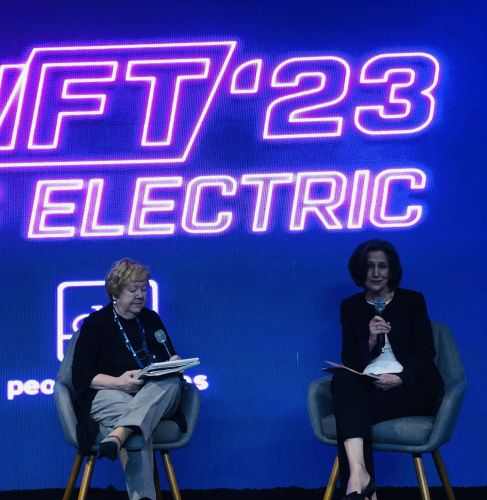BENTONVILLE, Ark. (BRAIN) — The Consumer Product Safety Commission will consider regulating micromobility devices, including e-bikes, but don't expect anything final to come before 2025.
Commissioner Mary T. Boyle addressed PeopleForBikes' SHIFT'23 conference Tuesday in front of an audience of industry professionals some of whom weighed in on the growing fire danger from lithium-ion batteries that power micromobility devices at a CPSC public hearing in July. Coming out of that public hearing, the consensus was the industry was asking for help to solve the problem. Boyle had an answer.
"I'm happy to announce we are poised to consider regulatory regulations for micromobility devices across the board, including e-bikes," Boyle said. "We're going to propose mandatory requirements for batteries in micromobility products. But it's going to take a while."
Boyle said in the next year, CPSC staff will research developing lithium-ion battery requirements, adding she thinks there will be additions to the voluntary standards in place currently. In December, the CPSC urged manufacturers and importers of e-bikes and other micromobility devices in a letter to comply with relevant safety requirements, including UL's 2849 standard.
"Over the next year, we will develop a proposal so that a year from now, we can bring it to the commission," Boyle said. "And if some version is approved, then we will open a public comment period. That's where you come in to weigh in on the proposal. And then we take those comments into consideration. And then hopefully a final ruling some time in 2025. Even though there's consensus and even though there was positive energy in that (July) forum, it is a long process. If the industry comes into compliance with voluntary standards that are in place now, that will be a really helpful part of the process."
While Boyle applauded New York City's recent legislative action to require recognized certification like UL for all micromobility devices and batteries, she said developing a federal standard is important.
"I look forward to doing that as quickly as possible. And to that extent, you all can come into compliance with voluntary standards and you can continue to evolve as the new standard comes into focus. I think that's the best way we can pursue safety for consumers."
When asked about global standards like ISO 4210 and EN 15194 by moderator Erika Jones, Boyle said it would be beneficial for the CPSC to consider those standards but not necessarily adopt them wholeheartedly.
"I think it's safe to say bike culture there is ingrained and more enhanced than it is in this country, so we can learn from them and coordinate with them. In terms of full adoption, there are differences in the speed (e-bikes in Europe provide assistance only to 15.5 mph instead of 20 mph in the U.S.). I think this comes to mind first."
Boyle expressed apprehension over Class 2 and Class 3 e-bikes and how the CPSC will view them.
"I do worry that, especially Class 2, with a throttle-based system, that there are no pedals involved," Boyle said.
Class 2 e-bikes actually do have pedals and provide throttle-controlled assistance. "Electric bikes" like Sur-Ron off-road are marketed as bicycles but have no pedals.
"It makes me wonder whether (a Class 2 e-bike is) a bicycle and what consumers will think of that. Is it a motorbike? Is it a motor vehicle? As for Class 3, I'm also concerned about the 28 mph speed. I worry that it doesn't match what ordinary riders can achieve, especially for older Americans. I think we need to look at that from a regulatory perspective and from your business perspective. Your consumer base might be different from the bicycle aficionados that make up your original base. Do those speeds make sense for children and older Americans?"
PeopleForBikes announced early during the conference the creation of a Technical Standards Working Group to collaborate with industry members, federal agencies, and standards-development organizations to craft voluntary standards for bicycles, e-bikes, and e-bike batteries.
The Technical Standards Working Group will bring together experts from across mechanical, electrical, and legal departments within the bike industry to craft updated standards that blend with international requirements and ensure that products sold in the U.S. are high quality and safe for consumers. The goals of the group are to update the existing requirements for the design, assembly, and testing of bicycles and electric bicycles and incorporate existing national and international standards where appropriate.
Boyle concluded by saying from a consumer and industry perspective, safety is good for business.
"As you consider that maybe there's a more diverse user base in terms of skill and ability to be thinking about these questions: You need to be thinking about young riders and senior riders, and you need to be thinking about how fast is too fast, thinking about what your brake systems are. You have the policymakers' ears. I think we're at a pivot point to make sure that positivity remains and that safety is front and center."


